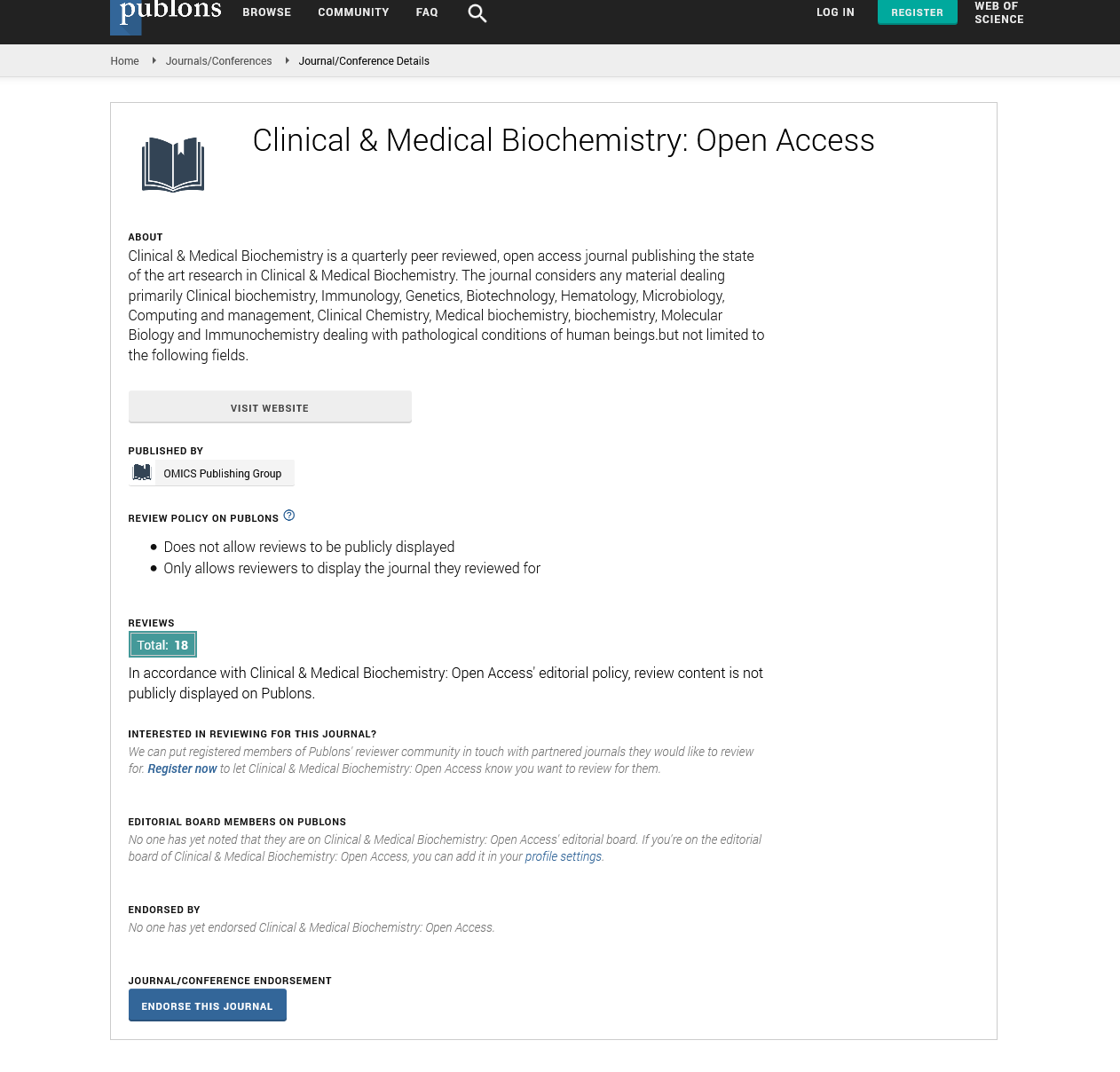Indexed In
- RefSeek
- Directory of Research Journal Indexing (DRJI)
- Hamdard University
- EBSCO A-Z
- OCLC- WorldCat
- Scholarsteer
- Publons
- Euro Pub
- Google Scholar
Useful Links
Share This Page
Journal Flyer

Open Access Journals
- Agri and Aquaculture
- Biochemistry
- Bioinformatics & Systems Biology
- Business & Management
- Chemistry
- Clinical Sciences
- Engineering
- Food & Nutrition
- General Science
- Genetics & Molecular Biology
- Immunology & Microbiology
- Medical Sciences
- Neuroscience & Psychology
- Nursing & Health Care
- Pharmaceutical Sciences
Short Communication - (2023) Volume 9, Issue 5
Supplementation Strategies for Mineral Balance in Hypertension
Sean Wilkins*Received: 01-Sep-2023, Manuscript No. CMBO-23-23082; Editor assigned: 04-Sep-2023, Pre QC No. CMBO-23-23082 (PQ); Reviewed: 18-Sep-2023, QC No. CMBO-23-23082; Revised: 25-Sep-2023, Manuscript No. CMBO-23-23082 (R); Published: 02-Oct-2023, DOI: 10.35841/2471-2663.23.9.186
Description
Hypertension, or high blood pressure, is a prevalent and serious health condition that affects millions of people worldwide. It is often referred to as the "silent killer" because it can go unnoticed for years, causing damage to vital organs such as the heart, brain, and kidneys. Hypertension is a significant risk factor for various metabolic disorders, including diabetes, dyslipidemia, and obesity. Hypertension as a Silent Threat Hypertension is a chronic medical condition characterized by elevated blood pressure levels [1]. It often remains asymptomatic until it leads to severe complications, such as heart attacks, strokes, and kidney problems. The exact cause of hypertension is often multifactorial, involving genetic, lifestyle, and environmental factors. Metabolic Disorders and their Prevalence Metabolic disorders involves a range of conditions that affect the body's metabolism, including diabetes, dyslipidemia (abnormal lipid levels), and obesity [2]. These disorders often coexist and contribute to the development of cardiovascular diseases, making them a global health concern.
The prevalence of metabolic disorders is increasing, driven primarily by inactive lifestyle, poor dietary habits, and genetic susceptibility. Potassium is an essential mineral that plays a vital role in regulating blood pressure. It helps maintain the balance of sodium in the body, which is essential for blood pressure control [3]. Low potassium intake has been associated with higher blood pressure levels and an increased risk of hypertension. Magnesium is another essential mineral that has collected recognition in the context of hypertension. It is involved in various biochemical processes that influence blood vessel tone and overall cardiovascular health [4]. Magnesium deficiency has been connected to hypertension and increased cardiovascular risk. Calcium, while primarily associated with bone health, also has implications for blood pressure regulation. Calcium is involved in the contraction and relaxation of blood vessels and may influence blood pressure. However, the relationship between calcium intake and hypertension is complex and requires further investigation. Potassium Deficiency Low potassium intake is common in many diets, especially those high in processed foods and low in fruits and vegetables [5]. Hypertensive patients often exhibit reduced potassium levels, which can contribute to elevated blood pressure. Adequate potassium intake through dietary changes or supplementation may help manage hypertension [6]. Magnesium deficiency is prevalent in the general population and has been observed in hypertensive individuals. Low magnesium levels can impair blood vessel function and promote inflammation, contributing to hypertension. Magnesium supplementation may have a role in blood pressure management for some patients.
The relationship between calcium intake and hypertension is less uncommon. While calcium is necessary for various physiological processes, excessive calcium supplementation has raised concerns about potential adverse effects on blood pressure and cardiovascular health [7]. Hypertension and diabetes frequently coexist, a condition known as "diabetic hypertension." The relationship between these two conditions is bidirectional, with hypertension increasing the risk of diabetes and vice versa. Mineral imbalances, particularly low magnesium levels, may contribute to this link, as magnesium is essential for insulin sensitivity and glucose metabolism [8]. Dyslipidemia, characterized by abnormal lipid levels in the blood, is a common metabolic disorder associated with cardiovascular risk. Some minerals, such as potassium, have been linked to improved lipid profiles. Potassium-rich diets may help lower cholesterol levels and reduce the risk of dyslipidemia in hypertensive patients. Obesity is a major risk factor for hypertension and metabolic disorders. Mineral deficiencies, especially magnesium and calcium, may increase the effects of obesity on blood pressure and metabolic health.
Adequate mineral intake through a balanced diet or supplementation could play a role in managing obesity-related metabolic disorders. One of the primary strategies for managing mineral status in hypertensive patients with metabolic disorders is through dietary modifications [9]. Encouraging a diet rich in potassium, magnesium, and calcium can help improve blood pressure control and metabolic health. This includes promoting the consumption of fruits, vegetables, whole grains, and dairy products. In some cases, supplementation may be necessary to address mineral deficiencies. However, it is essential to consult with a healthcare professional before starting any supplements, as excessive intake of certain minerals can have adverse effects [10]. Individualized approaches based on mineral status assessments are recommended. Lifestyle modifications, such as regular physical activity and weight management, are integral to the management of both hypertension and metabolic disorders. These lifestyle changes can complement dietary interventions and improve overall health outcomes.
Conclusion
Managing mineral status through dietary improvements, supplementation when necessary, and lifestyle modifications holds potential in the prevention and management of these interconnected health conditions. Ultimately, a holistic approach that addresses both mineral status and lifestyle factors is essential in the fight against the growing global burden of hypertension and metabolic disorders.
References
- Zhang Z, Zhao S, Wu H, Qin W, Zhang T, Wang Y, et al. Cross-sectional study: Relationship between serum trace elements and hypertension. J Trace Elem Med Biol. 2022;69:126893.
[Crossref] [Google Scholar] [PubMed]
- Lu CW, Lee YC, Kuo CS, Chiang CH, Chang HH, Huang KC. Association of serum levels of zinc, copper, and iron with risk of metabolic syndrome. Nutrients. 2021;13(2):548.
[Crossref] [Google Scholar] [PubMed]
- Tinkov AA, Bogdański P, Skrypnik D, Skrypnik K, Skalny AV, Aaseth J, et al . Trace element and mineral levels in serum, hair, and urine of obese women in relation to body composition, blood pressure, lipid profile, and insulin resistance. Biomolecules. 2021;11(5):689.
[Crossref] [Google Scholar] [PubMed]
- Blades B, Ayton S, Hung YH, Bush AI, La Fontaine S. Copper and lipid metabolism: a reciprocal relationship. Biochim Biophys Acta Gen Subj. 2021;1865(11):129979.
[Crossref] [Google Scholar] [PubMed]
- Rodríguez-Mortera R, Caccavello R, Hermo R, Garay-Sevilla ME, Gugliucci A. Higher hepcidin levels in adolescents with obesity are associated with metabolic syndrome dyslipidemia and visceral fat. Antioxidants. 2021;10(5):751.
[Crossref] [Google Scholar] [PubMed]
- Nakatani S, Mori K, Shoji T, Emoto M. Association of zinc deficiency with development of CVD events in patients with CKD. Nutrients. 2021;13(5):1680.
[Crossref] [Google Scholar] [PubMed]
- Fisher AL, Srole DN, Palaskas NJ, Meriwether D, Reddy ST, Ganz T, et al. Iron loading induces cholesterol synthesis and sensitizes endothelial cells to TNFα-mediated apoptosis. J Biol Chem. 2021;297(4).
[Crossref] [Google Scholar] [PubMed]
- Chen W, Eisenberg R, Mowrey WB, Wylie-Rosett J, Abramowitz MK, Bushinsky DA, et al. Association between dietary zinc intake and abdominal aortic calcification in US adults. Nephrol Dial Transplant. 2020;35(7):1171-1178.
[Crossref] [Google Scholar] [PubMed]
- González-Domínguez Á, Visiedo-García FM, Domínguez-Riscart J, González-Domínguez R, Mateos RM, Lechuga-Sancho AM. Iron metabolism in obesity and metabolic syndrome. Int J Mol Sci. 2020;21(15):5529.
[Crossref] [Google Scholar] [PubMed]
- Xu Y, Wei Y, Long T, Wang R, Li Z, Yu C, et al. Association between urinary metals levels and metabolic phenotypes in overweight and obese individuals. Chemosphere. 2020;254:126763.
[Crossref] [Google Scholar] [PubMed]
Citation: Wilkins S (2023) Supplementation Strategies for Mineral Balance in Hypertension. Clin Med Bio Chem. 9:186.
Copyright: © 2023 Wilkins S. This is an open-access article distributed under the terms of the Creative Commons Attribution License, which permits unrestricted use, distribution, and reproduction in any medium, provided the original author and source are credited.

